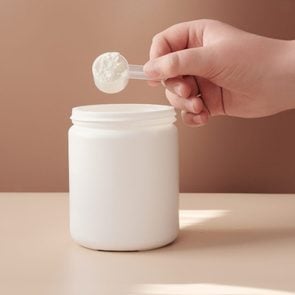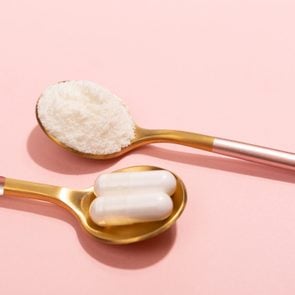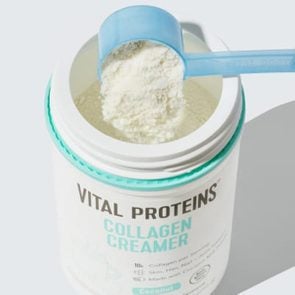What You Should Know About Marine Collagen
Updated: Apr. 07, 2021
Can marine collagen, which is created from fish, really boost skin health? Here's what the experts say.
Marine collagen supplements
There’s a good chance you’ve seen celebrities crediting their ageless appearance to a daily supplement stirred into their smoothie. The so-called miracle food: collagen peptides. Collagen supplements make some powerful promises: healthier hair, younger-looking skin, stronger nails, increased muscle strength, better gut health, greater joint support, and more. Marine collagen supplements are no exception.
But can a scoop of marine collagen powder really stop aging in its tracks? There’s some science behind the claims, but not much. Here’s everything you need to know about collagen and whether marine collagen is worth a try.
(These are the vitamin deficiencies vegetarians or vegans may experience.)
What is collagen?
Before the recent surge of collagen supplements, you probably didn’t give collagen too much thought. But it plays a big role in your body. For starters, it is the most abundant structural protein in the human body, created by breaking down the protein in food into amino acids. The connective tissues of our skin, hair, nails, tendons, bones, and cartilage are constructed of collagen.
There are at least 16 types of collagen, though these four main types are most often found in supplements:
- Type I: Accounts for a whopping 90 percent of the collagen in the body. The fibers of this heavy-duty collagen form the structural and mechanical scaffold of skin, tendons, bones, ligaments, cornea, teeth, and arterial walls.
- Type II: Mainly found in the cartilage of the ears, nose, larynx, trachea, ribs, and other joints
- Type III: A thinner version of type I, providing a protective covering for organs, muscles, and arteries
- Type IV: Adds structure and serves as a barrier for the skin
Why we want more collagen
We love collagen for a lot of reasons. It helps our joints move freely without pain. It keeps our skin from sagging and wrinkles from forming. And it makes sure our hair and nails stay healthy and strong.
But as the saying goes, all good things must come to an end. And while collagen production doesn’t come to a crashing halt, it does slow as we age.
As soon as we blow out the candles on our 20th birthday, collagen begins its decline. It decreases 1 percent each passing year. And in the first five years after menopause, collagen types I and II decrease up to 30 percent. (Here are the ways your heart changes post-menopause.)
It’s no wonder collagen supplements seem like an ideal way to kick-start production. These powders, pills, and liquids add forms of collagen back into the body.
What is marine collagen?
Collagen supplements come in a few forms. Traditional collagen is made from the skin, muscles, bones, and tendons of chicken, beef, or pork. Most of the stuff on the market contains animal-sourced collagen. There’s also vegan collagen, which doesn’t use any animal products. Instead, it’s made from genetically modified yeast and/or bacteria.
And then there’s marine collagen. It’s created from the parts of the fish not typically consumed by humans: the skin, scales, and bones.
“Some newer sustainable marine collagen may be sourced from other organisms, such as jellyfish, starfish, or sponges, though this usually represents a small portion of the amount produced,” says dermatologist Joseph Zahn, MD, assistant professor of dermatology at George Washington University Medical Faculty Associates.
In the supplement aisle, you’ll find it in powders, tablets, dissolvable tablets, and elixirs. And because you’re wondering: No, they don’t smell or taste like fish. (Here’s how to choose between collagen powder vs. pills.)
Marine collagen benefits
Marine collagen supplements have the potential to benefit the body. This form of collagen may strengthen hair roots and follicles, improve overall hair growth (including pattern baldness), increase antioxidant levels, help wounds and burns heal faster, and ease joint pain from arthritis and osteoarthritis. It also has the potential to plump sagging skin and fight wrinkles.
(Learn more about taking collagen for hair health.)
But potential benefits aren’t actual benefits. “All the studies so far are preliminary in nature and, as such, it’s difficult to definitively state that marine collagen supplements are beneficial for everyone,” says Dr. Zahn.
Take, for example, a study published in the Journal of Cosmetic Dermatology. The 45 female participants drank collagen powder (supplied by collagen maker Vinh Wellness Collagen) for 12 weeks. The outcomes at week 12 looked pretty good. Participants rated their skin better overall and reported improvements in wrinkles (15 percent), firmness (25 percent), elasticity (23 percent), radiance (22 percent), and hydration (14 percent), compared with a placebo.
“This study highlights some promising results, with some important caveats,” Dr. Zahn says. These results apply so far only to a very specific group of people and, unfortunately, can’t exactly be generalized to other individual subgroups. Plus, the study is very small.
“One limitation and interesting finding in the study is that different sides of the face responded differently to supplementation, which definitely needs explaining,” he says. The study’s hard-to-explain findings may point to factors not accounted for in the research. On a whole, the study is hardly enough to make marine collagen a staple recommendation, Dr. Zahn says.

The limited science on marine collagen
The sudden popularity of marine collagen doesn’t just stem from social media influencers and celebrities talking them up. There’s some actual science behind the host of cosmetic and health claims.
“A [Marine Drugs study] revealed a number of systematic review articles within the last year—likely reflecting the [supplement’s] popularity of use—for evaluating the efficacy of collagen nutraceuticals on skin aging,” says Zakia Rahman, MD, a dermatologist and scientist with Stanford Health Care in Redwood City, California. “While there is still more to be elucidated, the studies thus far seem relatively promising.”
Still, the research doesn’t quite match the magnitude of hype surrounding the supplement.
“Although there have been some small studies that have shown an improvement in skin hydration, there are issues with these also,” says dermatologist Rajani Katta, MD, who serves as volunteer clinical faculty at Baylor College of Medicine and McGovern Medical School at UT Health in Houston. “Many of these are sponsored by collagen manufacturers and are very small studies.”
With studies funded by collagen manufacturers, it’s hard to know if there was a conflict of interest that affected the results. And small studies, though important, always need to be backed up by larger studies before any definitive claims are made.
(Here’s what happened when one woman tried a Vitals Protein collagen creamer.)
Can I get collagen from eating fish?
Fish is just one type of food the body uses to make its own collagen. The protein in foods such as chicken, beef, pork, eggs, dairy, and plant-based proteins (think quinoa, beans, tofu, tempeh, and pistachios) is broken down into amino acids. But those protein-rich foods can’t work alone to create the building blocks of collagen.
They need vitamin C, zinc, and copper to turn the wheels of collagen synthesis. And you can get those in the foods you eat too.
Collagen powder supplements are digested the same way as the protein-rich foods you already eat. It isn’t processed and sent to specific areas in the body, which means you can’t choose whether that collagen powder affects your skin, joints, or nails. Your body uses it as it sees fit. This happens with animal-sourced collagen, vegan collagen, and marine collagen alike.
How to choose quality marine collagen
If you still want to give marine collagen a shot, see your doctor first to discuss any possible risks and benefits. Before you head to the store or buy online, read the label thoroughly and investigate the manufacturer.
“Any manufacturer can bring a product to market without having to get approval first, and there is no standard for quality control,” says Dr. Katta. ConsumerLab, an investigative laboratory, examined several collagen supplements and found one that was contaminated with a heavy metal called cadmium. That can lead to health problems.
That’s not to say there aren’t any good manufacturers. To stay safe, buy from a company that gets third-party certifications from NSF International, USP, or UL. You may also want to consider how environmentally friendly a company is.
“When I evaluate supplements, I try to be cognizant of the environmental impact of taking them,” says Dr. Rahman. Reputable companies that source their collagen from sustainably caught fish or non-GMO (without genetically modified organisms) are a plus.



